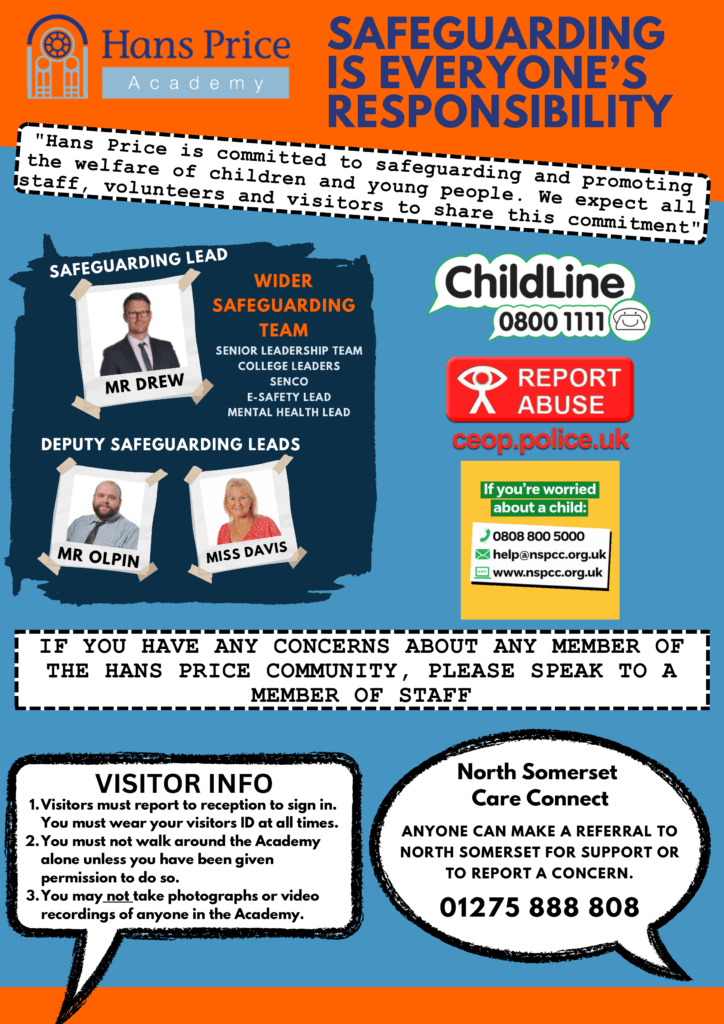Safeguarding Information
SAFEGUARDING IS EVERYONE’S RESPONSIBILITY
Hans Price Academy is committed to safeguarding and promoting the welfare of children and young people. It is our expectation that all staff, volunteers and members of the school community share this commitment.
Safeguarding Contact Details
Student Concerns:
As a child, if you feel unsafe, it’s important to seek help.
At the Academy, you can talk to a trusted key adult such as your Tutor, College Leader, or a favourite teacher. You can also raise concerns or seek advice through our [email protected] mailbox.
If you’re at home or in your community, you can call the Academy’s landline at 01934 629307 or email [email protected]
Additionally, you can reach out to Childline at 0800 11 11 anytime day or night for free support.
If you or someone else is in immediate danger, please call 999.
If you are concerned about the treatment of a child, you can do one of these things:
You can also raise a concern directly with North Somerset Safeguarding Children Partnership:
Meet the team:

Mental health and wellbeing support
Policy
The councillors and school staff team are committed to keeping our children safe and we regularly review our school policies and procedures to ensure that everything is being done to fulfil our duty of care. All staff are familiar with the government’s guidance for schools – Keeping Children Safe in Education
The Safeguarding Policy can be found along with all other Academy Policies on the Policies page under the Key Information menu
Employment Requirements
We are an equal opportunities employer. At least one member of every interview panel has had Safer Recruitment training. All offers of employment are subject to a disclosure and barring check (DBS), medical clearance and satisfactory references.
Online Safety
At Hans Price Academy we aim to equip our students with the knowledge, understanding and skills to use information and communication technology creatively and purposefully. A key aspect of this lies in being digitally literate. Online technologies play a huge role and so providing a broad and balanced e-safety education is vital to ensuring that students can navigate the online world safely and positively. Students learn about e-safety during ICT lessons, during SPACE lessons, as part of the Learning Family programme and through regular assemblies. Please contact our E-Safety Lead for advice & guidance.
E-Safety Updates:
On the news recently there are reports that relate to the Risk of Children and Young People ‘Live streaming’. The following links may be of use to you as they contain some guidance and advice for parents and carers regarding Live streaming.
Department for Education – Support for parents and carers to keep children safe online.
CEOP education team provides advice from the National Crime Agency (NCA) to help protect children and young people from online child sexual abuse.
Childnet offers a toolkit to support parents and carers of children of any age to start discussions about their online life, to set boundaries around onlinebehaviour and technology use, and to find out where to get more help and support
Internet matters provides age-specific online safety checklists, guides on how to set parental controls on a range of devices, and a host of practical tips to help children get the most out of their digital world
Let’s Talk About It has advice for parents andcarers to keep children safe from online radicalisation
UK Safer Internet Centre has tips, advice, guides and other resources to help keep children safe online, including parental controls offered by home internet providers and safety tools on social networks and other online services
Prevent
Prevent is about safeguarding people and communities from the threat of terrorism. Prevent is 1 of the 4 elements of CONTEST, the Government’s counter-terrorism strategy. It aims to stop people becoming terrorists or supporting terrorism.
www.ltai.info/what-is-prevent/
Incidents of extremism and radicalisation are rare and as such when they do occur, make the news. As with all safeguarding issues, it is important to be vigilant, and not complacent, but also not to panic.
Further support can be found on the Counter terrorism website ‘Act Early’
The website is aimed at family and friends and to reach out to communities. The purpose of the site is to increase awareness of the signs of radicalisation, where to go for help and support and to increase understanding and confidence in the referral process.
What is extremism and radicalisation?
Prevent defines extremism as: “vocal or active opposition to fundamental British values, including democracy, the rule of law, individual liberty and mutual respect and tolerance of different faiths and beliefs. We also include in our definition of extremism calls for the death of members of our armed forces”
Radicalisation is defined by the UK Government within this context as “the process by which a person comes to support terrorism and extremist ideologies associated with terrorist groups.”
However…
We live in a wonderfully diverse world, with both differences and similarities to celebrate. Exploring religious and different social beliefs, in a peaceful and non-violent way, is part of growing up and should not be confused with something more sinister. The best way to PREVENT extremism and radicalisation is by open discussion and increased understanding of each other.
As a parent…
- You know your child better than anybody else. Having open, honest conversations on a regular basis will allow your child to explore new ideas in a safe environment.
- Talk to your child about their online viewing. Social media such as YouTube and Facebook can be used to groom children towards a certain point of view.
- Discuss different points of view concerns topics in the news, modelling that there is always more than one point of view.
- Encourage your child to take an active part in their local community. This could be part of a sports club, social group, volunteering. Getting out, meeting and talking to people around you helps to understand and become part of a community.
As a school…
- All staff have had Prevent training from an accredited Prevent trainer in school.
- All staff have completed further online Prevent training
- We have updated our safeguarding procedures to reflect statutory requirements in the Government’s Counter-Terrorism and Security Act 2015.
- We have direct contact with the Local Prevent Officer and other
- external professionals to receive on-going support and two way communication.
- Students are encouraged to discuss and explore issues during Space lessons, Assemblies and on Focus days.
If you have any concerns that someone you know may be at risk of radicalisation, please contact the local police on 101.
If your concern is of an URGENT nature please dial 999 or the Anti-Terrorist Hotline 0800 789 321
Should you have any concerns relating to the safety and welfare of a child at the school you should immediately contact our safeguarding team at [email protected] or through the main school line: 01934 629307 and request to speak with someone in the safeguarding team.
Female Genital Mutilation (FGM) and Honour based Violence (HBV)
Female Genital Mutilation
Female genital mutilation is the mutilation of the external female genetalia for non-medical reasons. It is often referred to as female circumcision, ‘cutting’ or ‘sunna’.
Government Statement opposing FGM
Female Genital Mutilation (FGM) is child abuse and an extremely harmful practice with devastating health consequences for girls and women. Some girls die from blood loss or infection as a direct result of the procedure. Some women who have undergone FGM are also likely to find it difficult to give birth and many also suffer from long-term psychological trauma.
UK Law
Female genital Mutilation is a crime in the United Kingdom. Even if a girl is taken abroad to undergo FGM, it is still a crime in the UK if the mutilation is done by a UK national or a UK resident.
It is also a crime if a UK national or resident assists or gets a non-UK national or resident to carry out FGM overseas on a UK national or resident.
If FGM is committed against a girl under the age of 16, each person who is responsible for the girl at the relevant time is guilty of an offence.
Criminal Penalties
Anyone found guilty of an FGM offence – or of helping somebody commit one – faces up to 14 years in prison, a fine, or both. Anyone found guilty of failing to protect a girl from risk of FGM faces up to 7 years in prison, a fine, or both.
Support
If you are worried that this might happen to you or someone you know, you can speak to a member of the safeguarding team in school. They will be able to help and support you.
Alternatively, you can report this abuse by contacting one of the following:
If there’s immediate danger or if you or someone you know is in immediate danger of FGM, contact the police.
Call 999 to report emergencies or 101 for non-emergencies.
You should also contact the Foreign and Commonwealth Office if you know a British national who’s already been taken abroad.
Foreign and Commonwealth Office
Telephone: 020 7008 1500
If you or someone you know is at risk
Contact the NSPCC anonymously if you’re worried that a girl or young woman is at risk or is a victim of FGM.
NSPCC FGM Helpline
Email: [email protected]
Telephone: 0800 028 3550
From overseas: +44 (0)800 028 3550
UK organisations
You can get help and advice in the UK from:
https://www.gov.uk/female-genital-mutilation-help-advice
Child Sexual Exploitation
Sexual exploitation can take many forms from the seemingly ‘consensual’ relationship where sex is exchanged for attention/affection, accommodation or gifts, to serious organised crime and child trafficking. What marks out exploitation is an imbalance of power within the relationship. The perpetrator always holds some kind of power over the victim, increasing the dependence of the victim as the exploitative relationship develops.
Sexual exploitation results in children and young people suffering harm, which can cause a significant damage to their physical and mental health. Whilst some children can be supported to make a recovery, others may suffer serious life-long impairments which may, on occasion, lead to their death.
Any child or young person can be a victim of sexual exploitation, but children are believed to be at greater risk of being sexually exploited if they:
- are homeless
- have feelings of low self-esteem
- have had a recent bereavement or loss
- are in care
- are a young carer
However, there are many more ways that a child may be vulnerable to sexual exploitation and the signs that a child is being exploited are not easy to spot.
Signs of Grooming and Sexual Exploitation
Signs of child sexual exploitation include the child or young person:
- going missing for periods of time or regularly returning home late
- skipping school or being disruptive in class
- appearing with unexplained gifts or possessions that can’t be accounted for
- experiencing health problems that may indicate a sexually transmitted disease
- having mood swings and changes in temperament
- using drugs and/or alcohol
- displaying inappropriate sexualised behaviour, such as over-familiarity with strangers, dressing in a sexualised manner or sending sexualised images by mobile phone (“sexting”)
- they may also show signs of unexplained physical harm, such as bruising and cigarette burns
Should you have any concerns relating to the safety and welfare of a child at the school you should immediately contact our safeguarding team at [email protected] or through the main school line: 01934 629307 and request to speak with someone in the safeguarding team



